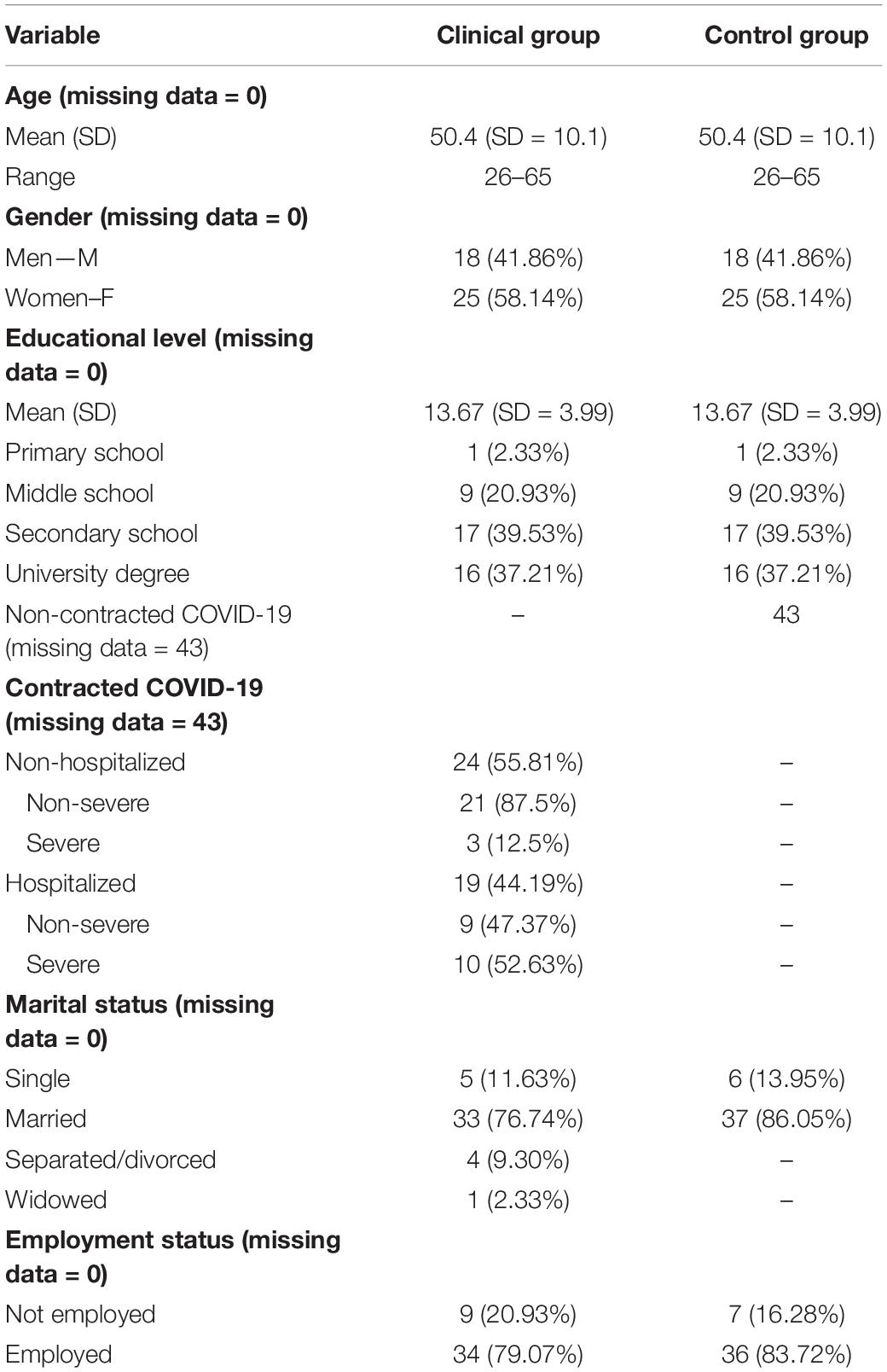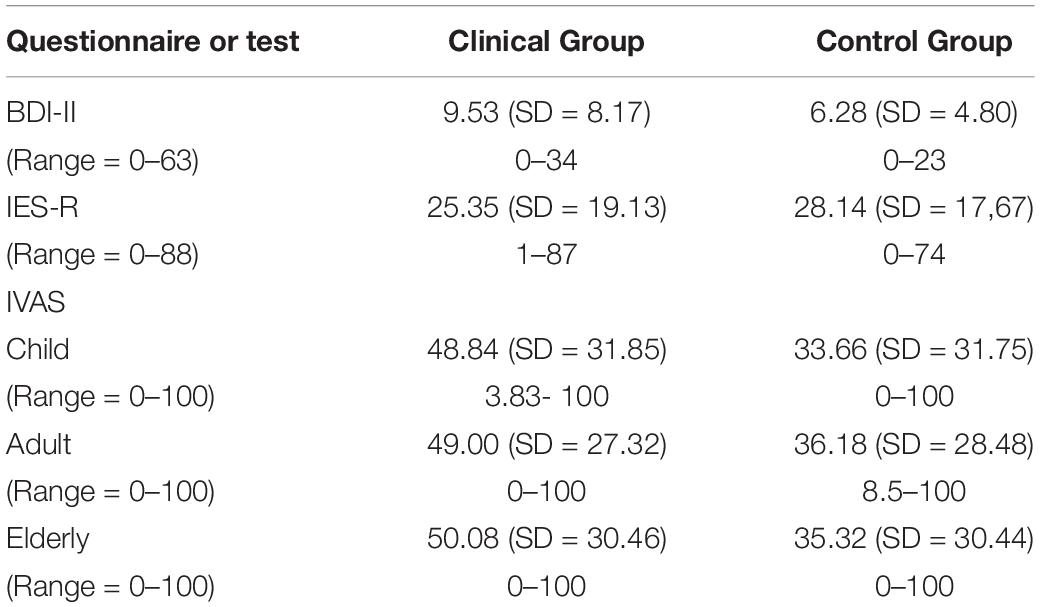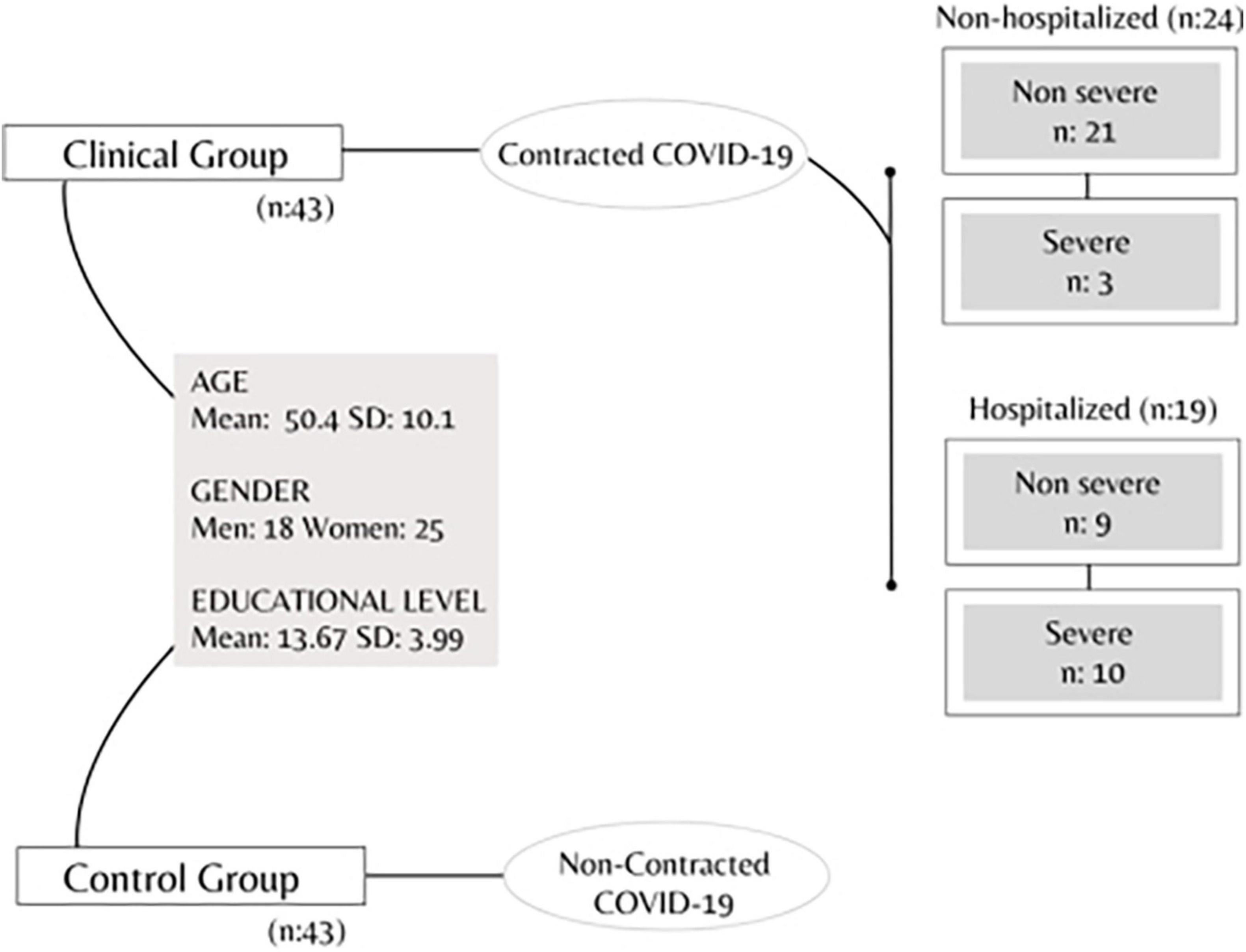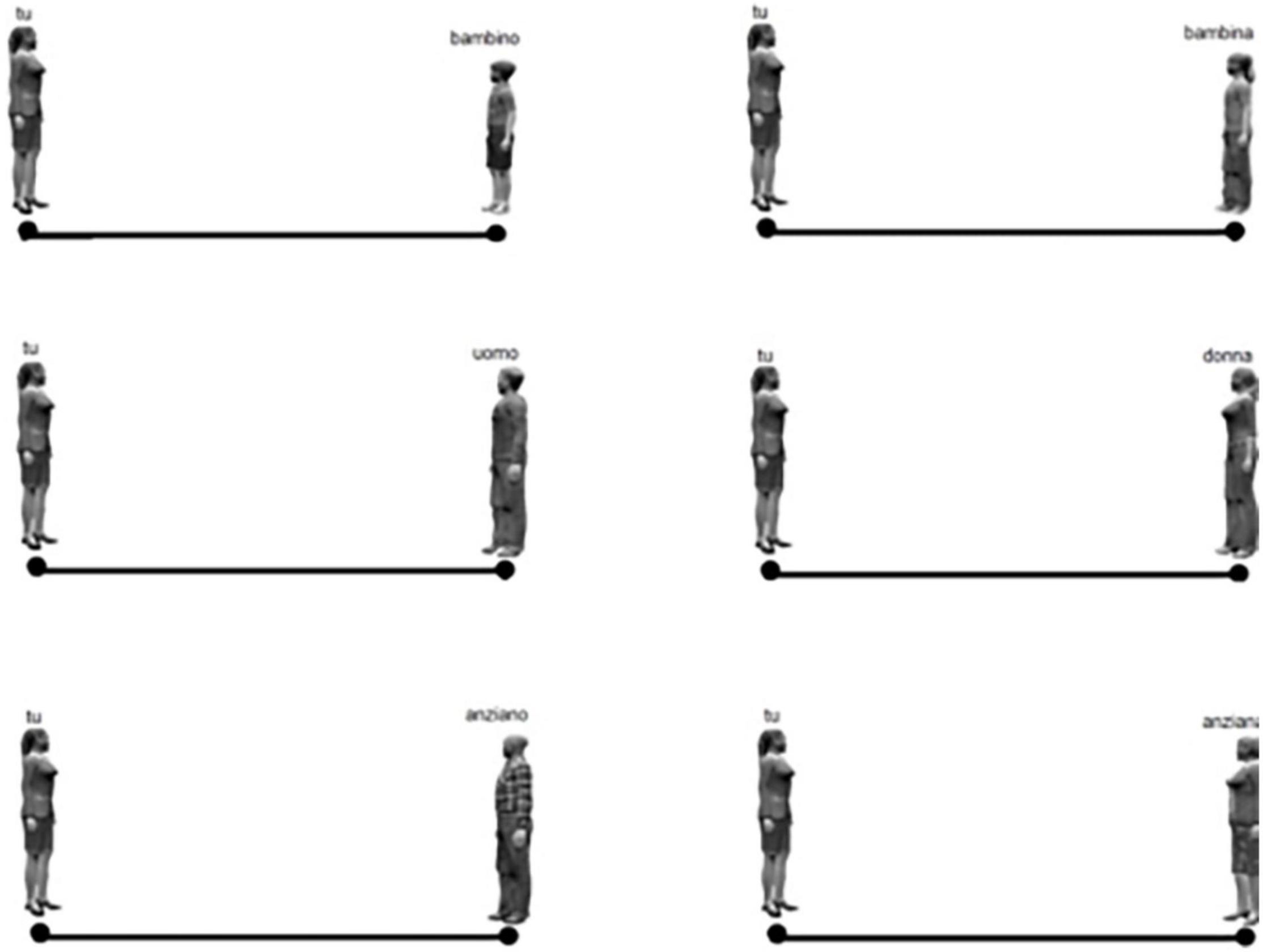- 1Department of Basic Medical Science, Neuroscience and Sense Organs, University of Bari “Aldo Moro,” Bari, Italy
- 2Department of Education, Psychology, Communication, University of Bari “Aldo Moro,” Bari, Italy
- 3Department of Psychology, Second University of Naples, Caserta, Italy
- 4Department of Interdisciplinary Medicine, Occupational Health Division, University of Bari “Aldo Moro,” Bari, Italy
- 5Department of Biomedical Sciences and Human Oncology, University of Bari “Aldo Moro,” Bari, Italy
The COVID-19 pandemic is an unprecedented event entailing long-term consequences on population health and welfare. Those who contracted the coronavirus may have suffered from both physical and mental health issues that unfold the need for tailored intervention strategies. Hence, our study aims to investigate the psychological and social consequences of COVID-19 on a sample of 86 participants, encompassing 43 patients (clinical group; 25 women; mean age = 50.4 ± 10.1 years) recruited from Bari University Hospital, 19 of whom were hospitalized due to the disease. The remaining 43 were individuals not fallen ill with COVID-19 to date (control group; 25 women; mean age = 50.4 ± 10.1 years). The investigation yielded significant gender differences in post-traumatic stress symptoms, depression, and representation of interpersonal distance (IPD), evaluated through the IES-R, the BDI-II, and the IVAS task, respectively. This pattern of results was not replicated in the control group. In general, participants who reported having experienced the most intense post-traumatic symptoms also presented a greater mood deflection and, more specifically, within the clinical group women obtained the highest scores on both scales. Women reported higher IES-R and BDI-II scores compared to men, that could indicate that women who have contracted COVID-19 are more exposed to post-traumatic and depressive symptoms. Our results also showed a significant effect of COVID-19 on IPD with a tendency of disease-experienced individuals to increase their preferred IPD from adults, children, and elderly people. Regarding gender differences in mood and proxemic behavior, a correlation between depressive symptoms and probable PTSD and a further correlation between probable PTSD and greater IPD were found in women from both clinical and control group. Overall, these findings might contribute to a better understanding of gender-based implications of the current pandemic on mental health, also leading to the development of integrated yet personalized intervention strategies.
Introduction
On March 20, 2020, Italy was second only to China for confirmed COVID-19 cases, and the increasing number of patients in need of medical care and hospitalization led to an overload on the national healthcare system (Saglietto et al., 2020). The infection ascribed to the novel coronavirus (provisionally named 2019-nCoV) was first identified in Wuhan, China, (Huang et al., 2020), and has been designated as a severe acute respiratory syndrome (SARS-CoV-2) (Xu et al., 2020). As the disease may be contracted through aerosol particles and droplets inhaled at short to medium distances (Bahl et al., 2020; Morawska and Milton, 2020), several health devices, notably non-pharmaceutical interventions, have been implemented globally to reduce the transmission of the virus and “flatten the curve” of infections. Among all containment measures and preventive strategies, the maintenance of physical distance has emerged as one of the most effective (Yang et al., 2020).
The contraction of COVID-19 appears to be prevalent in the elderly, in people affected by multiple underlying conditions, and in patients presenting atypical symptoms (e.g., delirium, falls, gastrointestinal symptoms) (Vena et al., 2020; Lozano-Montoya et al., 2021). In particular, older age, co-occurrent cardiovascular diseases, and increased C-reactive protein (CRP) levels are associated with higher risks for all-cause in-hospital mortality (Vena et al., 2020). Overall, in- and out-of-hospital mortality due to the infection requires clinical awareness as post-acute sequelae and complications are relatively frequent over 12 months after hospital discharge (Mainous et al., 2021; Sykes et al., 2021; Vincent et al., 2021).
Regarding mental health consequences, the spread of COVID-19 has contributed to increased vulnerability in anxiety, fear, uncertainty, and internal unrest (Hussain, 2020; Mazza M. G. et al., 2020), entailing a significant psychological strain on the general population (Lanciano et al., 2020; Marazziti et al., 2020; Saladino et al., 2020; Amendola et al., 2021). In particular, gender was found to be among the highest predictors of the onset of depressive symptoms associated with the COVID-19 outbreak, severe lockdown, and quarantine in women (Delmastro and Zamariola, 2020). These findings appear consistent with those derived from a survey of Italians’ short-term psychological responses to the pandemic experience, which reported a higher prevalence of distress and depression among women (Hodes and Epperson, 2019; Mazza C. et al., 2020; Yan et al., 2021). It is indeed evident that COVID-19 peritraumatic processes may manifest differently based on gender and other variables such as, for instance, employment stability and dimensions of home environment (Bonati et al., 2021). Another key psychological factor potentially affecting the subjective experience of COVID-19 could be hospitalization, as COVID-19 suspected individuals that were admitted to hospital departments and clinics reported higher psychological distress and poorer quality of life after discharge (Vlake et al., 2021). In-patients might also exhibit negative emotions (e.g., fear, denial, anger, health-related concerns) during the early stage of the disease that precedes the acceptance of the diagnosis (Sun et al., 2021).
In view of the high infectious load and relevant implications associated with COVID-19 (including, among all, mortality, and morbidity), the current pandemic has also resulted in particularly poor mental health outcomes in frontline healthcare workers (Kang et al., 2020; Lai et al., 2020; Rossi et al., 2020; Tan et al., 2020). In Italy, healthcare providers showed psychological symptoms of distress compatible with depression, anxiety, and post-traumatic stress disorder (PTSD) (Di Tella et al., 2020; Putri et al., 2021). Notably, PTSD symptoms in March 2020 reached a prevalence of 29.5%, contributing to the labeling of COVID-19 as a traumatic event (Forte et al., 2020). Individuals who had been hospitalized after having contracted the virus have shown features of anxiety and depression (Kong et al., 2020), as well as symptoms consistent with PTSD before being discharged (Bo et al., 2021). Symptomatology compatible with PTSD may persist even after recovery and regardless of the direct experience of hospitalization (Einvik et al., 2021).
The relative unpredictability of health outcomes, the diversity in perceived risks of contagion, and the modes of transmission of the virus causing COVID-19 may have also changed the readiness of individuals while approaching others. Indeed, Iachini et al. (2021) showed that anxiety related to risk perception during the pandemic could affect interpersonal-space boundaries and the fear of contact with others. This readiness to approach others may be conditioned by the use of personal protective equipment (PPE), such as face masks, leading to the perception of others as safer and more reliable (Cartaud et al., 2020).
People especially worry about being infected in places with high public traffic (e.g., public transport; shops; restaurants), and within overcrowded contexts, women seem to be more concerned about COVID-19 transmission than men (Gerhold, 2020). Despite men’s greater vulnerability to encountering more serious physical consequences from COVID-19, women are more likely to disclose negative emotions and expectations about their chances of contracting the disease and experiencing its adverse effects (Alsharawy et al., 2021). Consistently, women, compared to men, report greater perception and fear regarding the severity of COVID-19 and thus tend to be more compliant with pandemic prevention measures, such as cleaning surfaces and engaging in physical distancing (Galasso et al., 2020; Alsharawy et al., 2021).
Aim and Hypotheses
Considering the psychological burden entailed by the current pandemic, this study aims to investigate the extent to which having contracted COVID-19 may lead to changes in mood and perceived distress, and how these changes may be reflected in the perception of interpersonal distance. More specifically, the current work seeks to investigate potential sex differences that may emerge in parameters related to depression, likelihood of PTSD, and proxemic preferences toward children, adults, and the elderly. Consistent with the aforementioned literature, we expect that women could report higher scores of distress and psychological symptomatology associated with the psychosocial phenomenon of COVID-19. Indeed, the current pandemic represents a complex psychosocial phenomenon that entails, besides physical suffering, mental health implications that may also lead to behavioral changes such as a different perception of interpersonal distance. Moreover, we assume that women who contracted COVID-19 may have an even greater risk of suffering from distress and psychological symptoms. We also expect that variables such as gender and the direct experience of illness may affect self-reported proximity or distance behaviors.
Materials and Methods
Study Design
The study adopted a 2 × 2 design with Diagnosis (Clinical vs. Control) and Gender (Women vs. Men) as between-subjects factors. The dependent variables were depression, post-traumatic symptoms, and interpersonal distance (IPD).
Participants
The study was conducted with the voluntary participation of 86 individuals, 43 of whom contracted COVID-19 (i.e., clinical group). The clinical group consisted of 24 subjects who were not hospitalized, including 21 individuals who suffered from a non-severe form of the disease, and 3 who contracted COVID-19 in a severe form. Within the same group of COVID-19 patients, 19 subjects have, instead, undergone hospitalization, presenting in nine cases a non-severe form of the disease, whereas the remaining 10 developed severe symptoms. Conversely, the 43 participants forming the control group reported not having contracted the disease themselves.
The subjects included within the clinical group have been enlisted at the A.O.U. Policlinico of Bari (Italy) and recruited from both the Clinic of Pneumology of the Department of Internal Medicine and the Clinics of the Department of Occupational Medicine. The survey focused on the assessment of the symptoms of post-traumatic stress, depression, and perception of interpersonal distance (IPD) through the administration of the Impact of Event Scale—Revised (IES-R) (Weiss and Marmar, 1996), the Beck Depression Inventory—Second Edition (BDI-II) (Beck et al., 1996), and a digitalized version of the Interpersonal Visual Analog Scale (IVAS) (Iachini et al., 2021), respectively.
All subjects who entered the study provided written informed consent to the evaluation and underwent the administration of the research protocol (i.e., IES-R, BDI-II, and IVAS).
Measures
The Beck Depression Inventory—Second Edition (BDI-II) (Beck et al., 1996) is a brief and time-effective self-report tool with a cut-off of 16 and a split in severity. The inventory consists of 21 items and is rated along a 4-point Likert scale (i.e., from 0 to 3). The Italian version of the instrument (Ghisi et al., 2006) represents a reliable and valid measure of depressive disorders in the Italian context (Sica and Ghisi, 2007), allowing for the assessment of the presence and magnitude of depressive symptoms in adults over a 2-week period.
The psychological impact of stressful events has been measured using a version of the Impact of Event Scale-Revised (IES-R) (Weiss and Marmar, 1996). The IES-R is a self-report questionnaire consisting of 22 items and three sub-scales that measure medium avoidance, intrusion, and hyperarousal. Each item can be evaluated from 0 to 4 and is referred to the last seven days prior to the administration. The total score can range from 0 to 88, with higher scores representing a greater psychological impact triggered by the stressful event considered. In the present study, trauma-related stress symptomatology was assessed with specific regard to the COVID-19 event. To this end, the Italian version of the questionnaire (Giannantonio, 2005) was adopted to detect the presence of symptoms related to a likely PTSD is estimated on a cut-off basis (IES score of 33 or more).
The software package Psytoolkit (Stoet, 2017) was used to create a survey that includes a version of the Interpersonal Visual Analog Scale or IVAS (Iachini et al., 2021) that investigates interpersonal distance (IPD) in an analog mode. For the evaluation of IPD participants were presented on the screen of a PC images depicting two different characters on opposite sides of a line: one of the figures (men or women) represented the participant, whereas the other one represented a different subject whose age and gender varied. Participants were asked to move the cursor and indicate the IPD they preferred to maintain from the subject at the opposite end of the line, carrying on the task for all items presented (Figure 1).
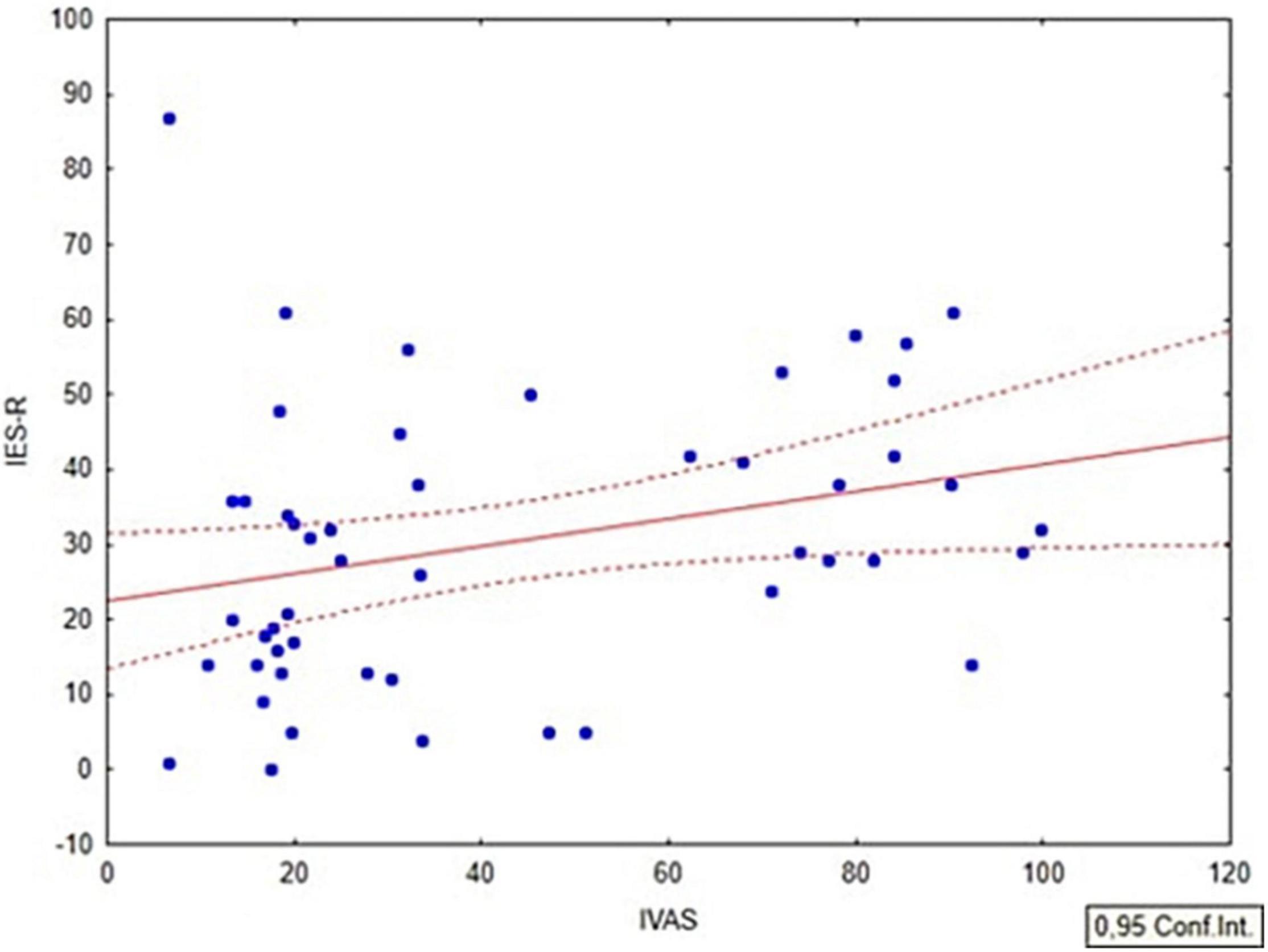
Figure 1. Example of the trials of IVAS. The label “TU” indicates a women participant and the other character on the opposite of the line represents the confederate from which a preferred distance must be indicated.
Procedure
Data collection was carried out between July 20, 2021, and October 25, 2021, i.e., following the outbreak provoked by the Delta SARS-CoV-2 variant in Italy. The study involved A.O.U. Policlinico of Bari for the recruitment of participants belonging to the clinical group, the University of Bari “Aldo Moro” for the recruitment of participants belonging to the control group, and the University of Campania Luigi Vanvitelli that provided for the IVAS for the assessment of interpersonal distance (IPD).
COVID-19 patients were included in this study on condition that they were aged between 18 and 65 years and did not suffer from major neurocognitive disorders, based on the Diagnostic and Statistical Manual of Mental Disorders (DSM-5) criteria (American Psychiatric Association, 2013). The exclusion of underlying neurocognitive disorders followed a brief clinical examination and screening.
The clinical group was selected from a pool of subjects scheduled for clinical assessment and medical consultations after having contracted COVID-19. These subjects were assigned to the Unit of Clinical Psychology and Neuropsychology by the referring physicians for either the Department of Internal Medicine or the Department of Occupational Medicine. Thus, well-trained psychologists provided the patients with clinical assessment tools and proper instructions.
All participants were asked to provide written informed consent. Among them, those who met the inclusion criteria for our study could pursue psychological assessment. Sociodemographic data (i.e., age, sex, level of education) were considered in recruiting control group subjects with characteristics identical to those of clinical subjects. Control subjects started an online survey consisting of the same assessment instruments proposed to the clinical group, after having filled in the informed consent through a dedicated online form.
Both clinical and control subjects were administered the psychometric protocol comprising: (1) the Beck Depression Inventory—Second Edition (BDI-II) (Beck et al., 1996); (2) the Impact of Event Scale-Revised (IES-R) (Weiss and Marmar, 1996); (3) the Interpersonal Visual Analog Scale (IVAS) (Iachini et al., 2021). The overall time required by each participant to complete the questionnaires and the task ranged from 15 to 30 min.
Study Arrangements
The adoption of some precautions allowed to limit potential internal validity bias. In particular, the whole sample shared the same geographical context of origin (Apulian region in Southern Italy), where the same restrictions implemented by the Government to limit the transmission of Sars-Cov-2 were in force. All clinical subjects referred to the U.O.S. of Clinical Psychology and Neuropsychology scheduled for post-COVID monitoring at the General Hospital of Bari were included in the study as they met the preset eligibility criteria. None of them discontinued or withdrew their participation, presenting a response rate of 100%. The same adherence to the assessment procedure was recorded by controls who were paired to clinical subjects based on common sociodemographic characteristics to provide comparability between the two groups and control for potential confounders.
Statistical Methods
Variance analyses and correlations have been carried out by means of the software package “Statsoft Statistica.” Before carrying out parametric tests, kurtosis and asymmetry tests were performed for all the measurements obtained, suggesting appropriate symmetry and peakedness of the distribution (e.g., DeCarlo, 1997). Two-way ANOVAs were performed to compare the means of the two samples (i.e., Clinical vs. Control; Women vs. Men), on the variables of the study (i.e., depression, post-traumatic symptoms, and IPD). Both gender and diagnosis were included as categorical predictors, whereas the BDI-II, IES-R, and IVAS scores (interpersonal proximity from children, adults, and the elderly) were considered as dependent variables. A repeated-measure ANOVA was used to compare means across variables based on repeated IVAS observations. Bonferroni post hoc tests were performed to explore further and to identify which pairs of means are statistically different.
Correlations were performed between the scores at IVAS, BDI-II, and IES-R within the whole group of participants and accounting for the two categories of diagnosis and gender. All correlation findings were corrected through Benjamini–Hochberg False Discovery Rate (FDR) to control for type-I errors when performing multiple comparisons.
Results
Sociodemographic and Clinical Variables
A total of 86 participants were recruited for the study. The clinical specimen consisted of 18 men and 25 women aged approximately 50.4 years (SD = 10.1), and with an average education of 13.67 years (SD = 3.99). The control group is composed of women and men in equal numbers (18 men; 25 women) and with the same age (= 50.4; SD = 10.1) and educational level (= 13.67; SD = 3.99) of the clinical group, but who have not contracted the virus.
Table 1 and Figure 2 shows the demographic and clinical characteristics of the participants in the study sample, whereas Table 2 displays BDI-II, IES-R, and IVAS scores reported by both clinical and control subjects.
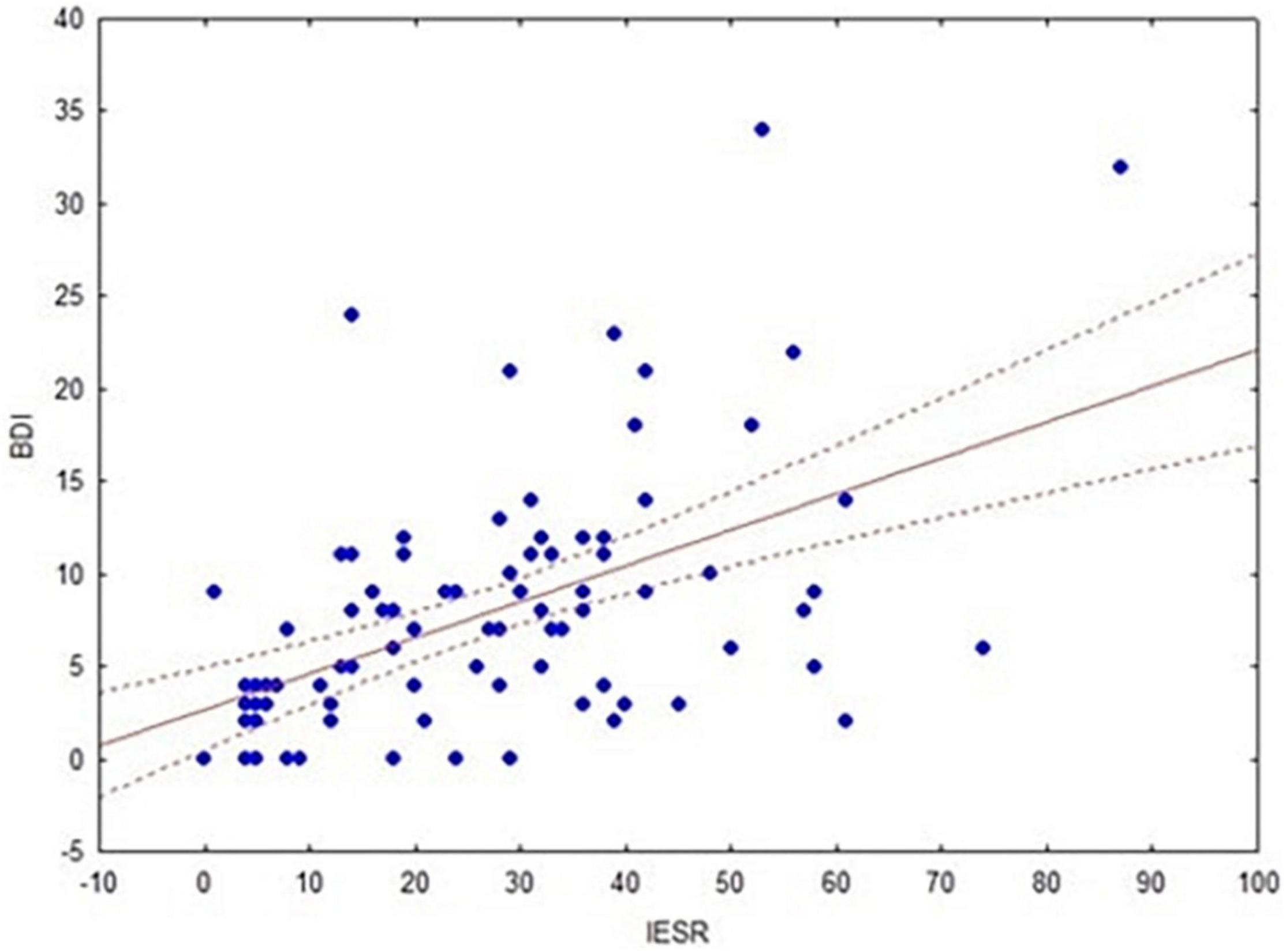
Figure 2. The flow diagram of participants shows the main characteristics of the clinical and control groups.
Analysis of Variance
Depressive Symptoms
A 2 × 2 ANOVA with Diagnosis (Clinical vs. Control) and Gender (Women vs. Men) as between-subjects factors, and BDI-II as dependent variable was performed. No Diagnosis effect was detected (df = 1; F = 3.5; p = 0.06; Cronbach’s alpha = 0.5), although a marginal significant was observed. With respect to gender differences, we found that women had higher BDI-II scores than men (df = 1; F = 4.46; p = 0.038; Cronbach’s alpha = 0.6). However, a significant interaction between diagnosis and gender on BDI-II scores was observed only among women who contracted COVID-19 (df = 1; F = 9.08; p = 0.003; Cronbach’s alpha = 0.9; Figure 3). Bonferroni post hoc analysis revealed that women who contracted COVID-19 had higher scores than women who did not contract the disease (p = 0.002) and men, regardless of their diagnosis (respectively, p = 0.003, and p = 0.004).
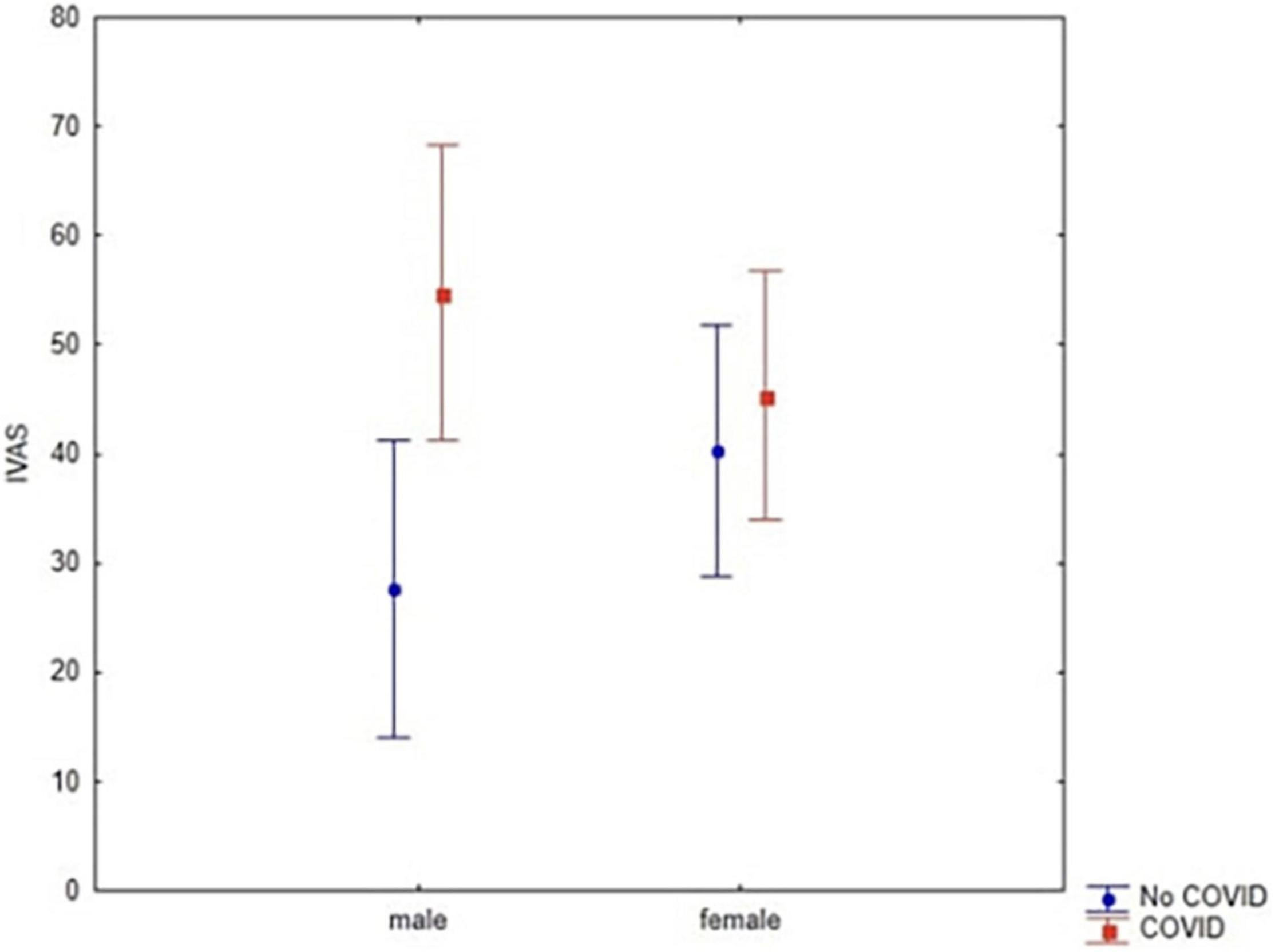
Figure 3. Interaction between Diagnosis and Gender (F = 9.08; p = 0.003) through BDI-II scores. Vertical bars denote 0.95 confidence intervals.
The Psychological Impact of Stressful Events
A 2 × 2 ANOVA with Diagnosis (Clinical vs. Control) and Gender (Women vs. Men) as between-subjects factors and IES-R as dependent variable was performed. Results showed a Gender effect, as women reported significantly higher IES-R scores than men (df = 1; F = 4.63; p = 0.03; Cronbach’s alpha = 0.6). No significant effect emerged for diagnosis (df = 1; F = 0.96; p = 0.33; Cronbach’s alpha = 0.2) and no significant interaction was found between diagnosis and gender with reference to IES-R scores (df = 1; F = 2.64; p = 0.11; Cronbach’s alpha = 0.9) (Figure 4).
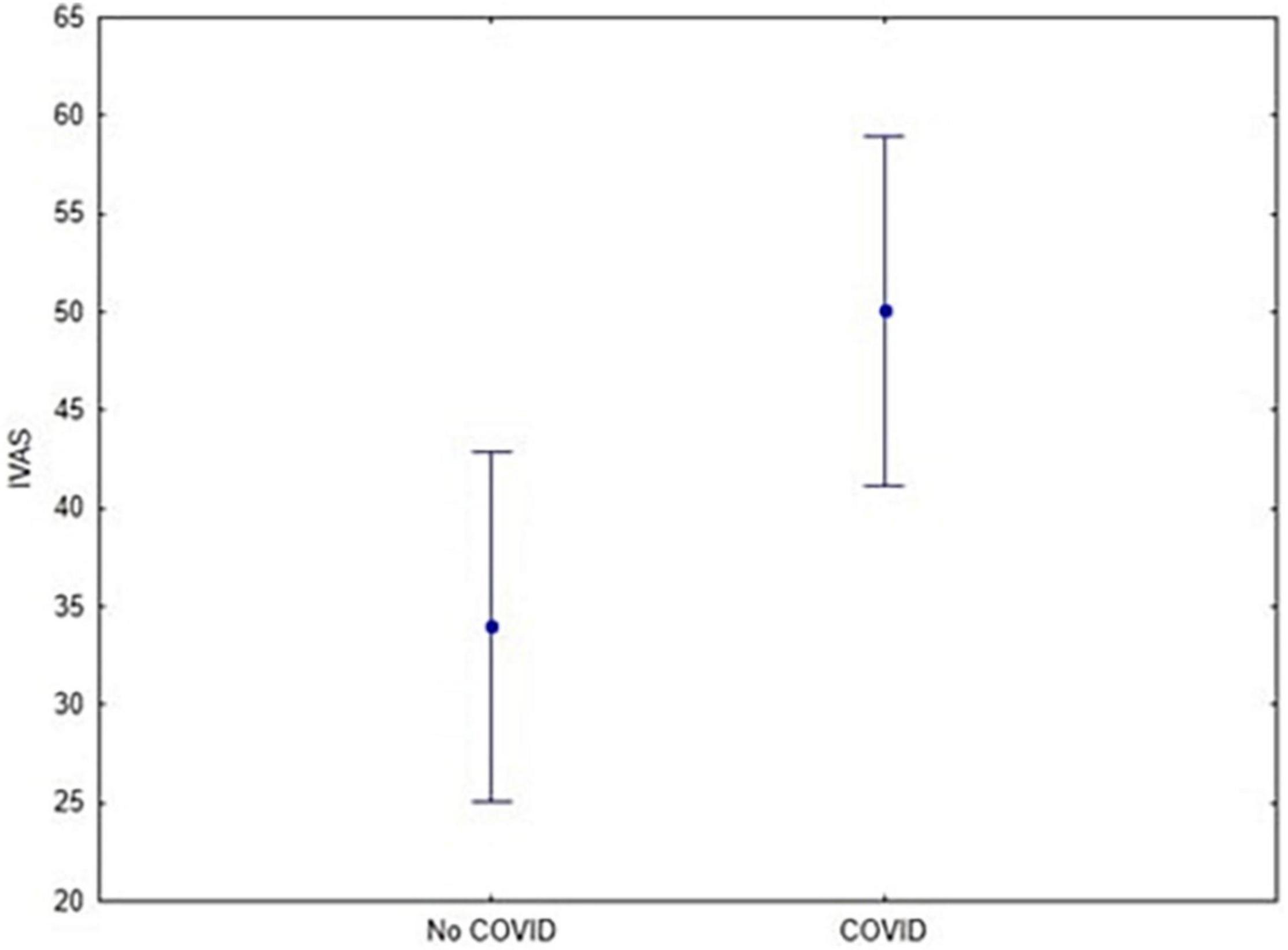
Figure 4. Interaction between Diagnosis and Gender (F = 4.63; p = 0.03) through IES-R scores. Vertical bars denote 0.95 confidence intervals.
3.2.3 Interpersonal Distance
A 2 × 2 mixed ANOVA with Gender (Women vs. Men) as between factor and IVAS scores as within-subjects was performed. We found that Diagnosis may have affected IVAS scores, as participants who contracted COVID-19 had higher scores than those who did not contract the disease (df = 1; F = 6.5; p = 0.013; Cronbach’s alpha = 0.7, Figure 5).
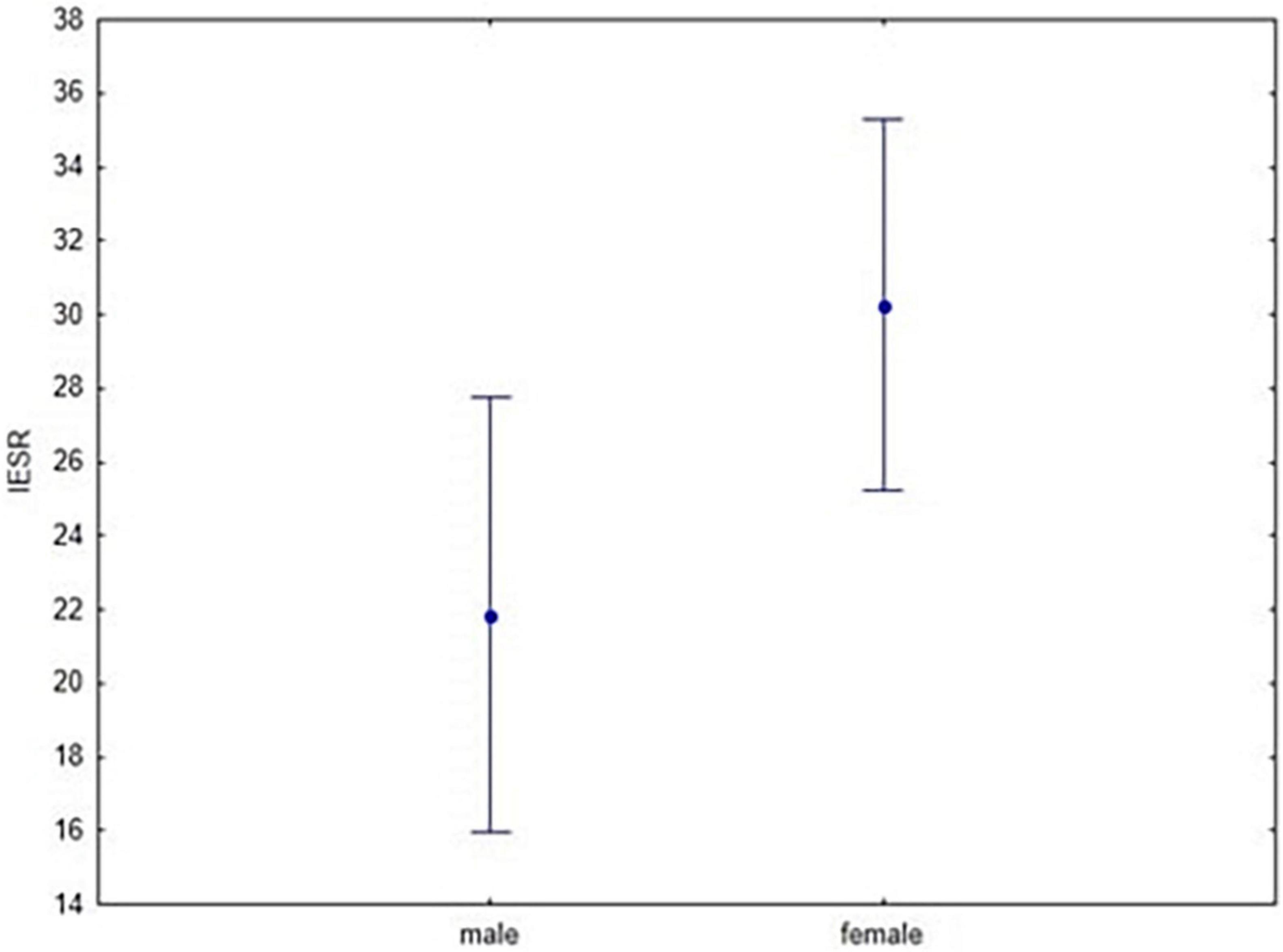
Figure 5. Gender effect on IVAS score (F = 6.5; p = 0.01). Vertical bars denote 0.95 confidence intervals.
In addition, we found a relevant trend in the interaction between diagnosis and gender (df = 1; F = 3.05, p = 0.08; Cronbach’s alpha = 0.4; Figure 6) which yet was not significant. As for the other main effects observed through ANOVAs, we further explored this potential interaction through a post hoc analysis. Hence, we found that men’s scores varied between the clinical and the control group. In particular, men who did not contract COVID-19 reported lower IVAS scores (Bonferroni post hoc p = 0.04). Nevertheless, these data require further investigation to be supported as no (other) significant effect or interaction emerged (all F < 3.05; p > 0.08).
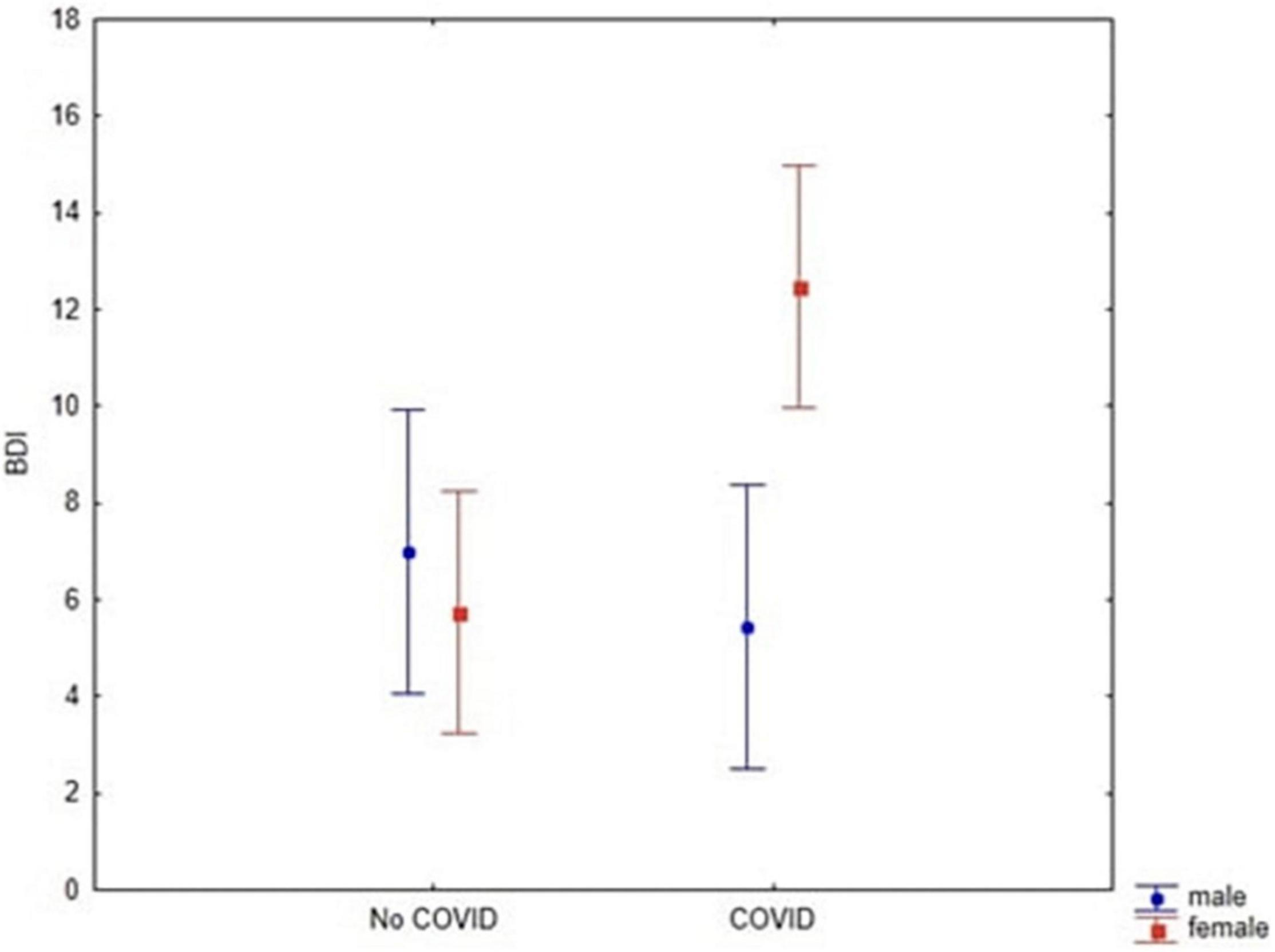
Figure 6. Interaction between Gender and Diagnosis (F = 3.05, p = 0.08) through IVAS scores. Vertical bars denote 0.95 confidence intervals.
The total results of the aforementioned ANOVAs are summarized in Table 3.
Pearson’s Correlations
We found a strong correlation between BDI-II and IES-R scores within the whole sample (r = 0.5, p = 0.0001, FDR-corrected = 0.0003; Figure 7). The same correlation was observed within the clinical (r = 0.65; p = 0.0001, FDR-corrected = 0.0003) and the control group (r = 0.41; p = 0.006, FDR-corrected = 0.009), respectively. Another significant correlation concerned the BDI-II and IES-R scores within women (r = 0.51; p = 0.0001, FDR-corrected = 0.0003) and men (r = 0.48; p = 0.003, FDR-corrected = 0.006), respectively.
Additionally, we performed a Pearson’s correlation between IVAS scores, BDI-II, and IES-R. No significant associations between BDI-II and IVAS (r = −0.05; p = 0.66, FDR-corrected = 0.66), and IES-R and IVAS (r = 0.08; p = 0.47, FDR-corrected = 0.5) emerged within the whole sample. Conversely, a relevant trend pertaining to the correlation between IVAS and IES-R scores was found within the women group (r = 0.29; p = 0.04, FDR-corrected = 0.056; Figure 8). No other significant correlation emerged within the men group, regardless of the COVID-19 diagnosis (all r < 0.05; p > 0.7).
Discussion
The present research work sought to examine changes in mood and distress based on having or not contracted the COVID-19, and how changes in these psychological variables may have been reflected in the perception of interpersonal distance. The study also investigated gender differences, revealing that women might have experienced a greater psychological burden than men and they are also more prone to experience severe depressive and post-traumatic symptoms. In particular, women who contracted the disease showed higher levels of depression than men. The analysis of interpersonal distance revealed people who contracted the infection tend to prefer greater distancing from others. Further associations between depressive and post-traumatic symptoms as well as potential salient trends between post-traumatic symptoms and IPD were observed within the women group.
The findings of our study thus indicated that the women may be related to a higher occurrence of depression and probable PTSD. Depressive symptoms in women also seem to be associated with having contracted COVID-19 as women who contracted the disease reported higher scores at the BDI scale measuring depressive state. These results appear to be in line with previous research that highlighted the association between the women and increased risks for psychological discomfort (Mazza C. et al., 2020; Qiu et al., 2020; Wang et al., 2020), as well as evidence of women’s vulnerability to distress and the development of symptoms compatible with PTSD (Sareen et al., 2013; Liu et al., 2020). These findings also appear consistent with the literature concerning women’s exposure and risks for psychological distress (Sareen et al., 2013; Liu et al., 2020; Mazza M. G. et al., 2020; Qiu et al., 2020; Wang et al., 2020).
Furthermore, this study showed how having contracted COVID-19 may have affected interpersonal distance, made manifest by the propensity of participants who have suffered from the disease to maintain greater distances from adults, children, and the elderly, compared to those who have never been infected. The increase in interpersonal proximity has also been evaluated in previous studies as a useful method for dealing with epidemic situations (Caley et al., 2008). To date, current recommendations suggest standing about 2 meters away from others while wearing protective facial masks, whereas without the masks an even greater IPD is expected (Chu et al., 2020; Setti et al., 2020). The maintenance of the recommended long distances (i.e., social distance) represents an ongoing challenge because it would result in a change in the natural proxemic preference that is less than one meter only in informal meetings (Welsch et al., 2020), although the perception of interpersonal space has undergone a strong variation due to the pandemic (Iachini et al., 2021). The analyses also revealed a tendency for men to maintain less interpersonal distance from children, adults, and the elderly. This behavior does not appear to be related to disease contraction and is consistent with the literature stating that, in general, the women have higher risk perceptions than men and tend to estimate a lower likelihood of the COVID-19 crisis being solved completely, leading to a return to “normal,” everyday life.
Moreover, recent COVID data showed that women are more concerned about COVID-19 than men (Gerhold, 2020) that may result in behavioral changes because of their beliefs and expectations related to the pandemic event (Alsharawy et al., 2021). Consequently, our data may be consistent with an increase in women’s perception of distress that may be reflected through the adoption of greater proximal behavior than men. also considering the high rate of comorbidity between PTSD and major depressive disorder (Elhai et al., 2008; Roley et al., 2015). During the COVID-19 pandemic, several symptoms attributable to PTSD have emerged as intense and persistent even after recovery in individuals with a history of depression who had previously contracted the virus (Einvik et al., 2021).
In our study, emerged a positive correlation between scores indicative of probable post-traumatic stress disorder and greater mood deflection was indicated by scores to BDI-II and IES-R. These findings also revealed gender-related differences with a greater tendency for women to obtain higher scores, consistent with the literature (Galasso et al., 2020; Alsharawy et al., 2021).
Finally, findings obtained from correlational analyses may lay the groundwork for further investigation into correlations between scores indicative of probable post-traumatic stress disorder and greater interpersonal distance. Indeed, despite the lack of data on long-term adaptation strategies for IPD in response to the COVID-19 health crisis, we know that traumatic situations can persistently increase individuals’ need for greater IPD (Bogovic et al., 2014). Such eventuality could also occur during and after the current pandemic that it has been defined as an impactful, trauma-related event (Forte et al., 2020; González-Sanguino et al., 2020; Johnson et al., 2020; Liu et al., 2020). Overall, the preliminary evidence obtained may also set the stage for new data collection and analysis to gain a better understanding of the potential interactions between diagnosis and gender in IPD adjustment, besides the associations between post-traumatic symptoms and IPD according to gender.
Limitations
Although our results are referred to subjects residing in Southern Italy, risk perception and concern about contagion was found to be high across the country (Lanciano et al., 2020), consistent with the WHO statement about the global impact of the pandemic (Alsharawy et al., 2020). The relatively small sample size reflects, however, the need to collect further data from additional participants and at other stages in the progression of COVID-19 transmission, including the randomized use of digital versions of the psychometric measures used. Albeit significant, these preliminary findings may indeed have limited clinical translatability in improving understanding of COVID-19 from both psychological and psychosocial perspectives. Moreover, the estimates deriving from the administration of both online and offline assessment protocols, as well as from the virtual task for interpersonal proximity may not be generalizable to a varied array of real-life contexts, where other external variables might affect the actual spatial and social behavior.
Future studies with a larger sample should account for potential predictors of depression, post-traumatic symptoms, and variation in IPD preference within the clinical group (e.g., considering the type, severity, and persistence of COVID-19 symptoms; ICU stay; oxygen supply; timepoint of COVID-19 diagnosis, negativization, hospital discharge, and/or complete recovery; duration of hospitalization). In particular, based on routine hospital care, it would be advisable to explore, in more detail, if there could be differences within the clinical group between patients who were hospitalized and those non-hospitalized, and between individuals who suffered from a non-severe disease and those who contracted COVID-19 in a severe form as. Further, the investigation of the role played by key factors such as, for instance, resilience, overall quality of life, burden of isolation measures, and worries about contracting the disease, besides contact history and risk factors for severe disease, may be warranted.
Conclusive Remarks
The present study involved 86 participants to appraise differences by diagnosis and gender related to the presence of depressive, post-traumatic symptoms, and proxemic preferences following the peak of Sars-Cov-2 Delta variant in Italy. Psychological assessment relied on the combined use of direct (self-report) and indirect (visual analogic) measures to delve into both psychological distress and distance behavior related to COVID-19, also considering differential gender vulnerability to the psychological repercussions of the disease on psychosocial functioning. On the whole, these preliminary findings could contribute to a better understanding of the psychological and psychosocial correlates and potential implications of COVID-19 on both disease-experienced and healthy individuals, setting the basis for future research and the design of more targeted interventions to foster mental health during and after the pandemic.
Data Availability Statement
The datasets presented in this study can be found in online repositories. The names of the repository/repositories and accession number(s) can be found below: Forms, material, and data are available on the Open Science Framework (OSF): https://osf.io/qtvwe/.
Ethics Statement
The study was given ethical approval by the Interregional Ethics Committee of the “Azienda Policlinico” of Bari, and executed according to the Declaration of Helsinki (No. ET-20-01). The patients/participants provided their written informed consent to participate in this study.
Author Contributions
PT: concept and design of the work, acquisition of the data, development of the analysis and interpretation of data, and drafting the manuscript. TL, FA, FB, and CA: concept and the design of the work, acquisition and interpretation of data, and manuscript revision. AM, FS, SC, JL, and GR: acquisition and interpretation of the data. AS, SI, LV, AV, MD, and AC: concept and the design of the work, analysis and interpretation of data, and critical revision. All authors contributed to the article and approved the submitted version.
Conflict of Interest
The authors declare that the research was conducted in the absence of any commercial or financial relationships that could be construed as a potential conflict of interest.
Publisher’s Note
All claims expressed in this article are solely those of the authors and do not necessarily represent those of their affiliated organizations, or those of the publisher, the editors and the reviewers. Any product that may be evaluated in this article, or claim that may be made by its manufacturer, is not guaranteed or endorsed by the publisher.
Acknowledgments
We thank all participants for sharing their time by participating in this study. We thank the evaluators for their important contribution, Luciana Loponte, (Department of Biomedical Sciences and Human Oncology), Celeste Dalfino, and Chiara Rosaria Massagli, (Department of Interdisciplinary Medicine, Occupational Health Division). We also thank for patient evaluation and recruitment, Simona de Santis, Cristina Filannino, Valeria Ladisa, Jessica Pisani, Ilaria Vacca, and Valentina Valenzano, (U.O.S. Clinical Psychology and Neuropsychology—Policlinico di Bari).
References
Adhanom, T. (2020). Who Director-General’s Opening Remarks at the Media Briefing on COVID-19. World Health Organization. Available online at: https://www.who.int/director-general/speeches/detail/who-director-general-s-opening-remarks-at-the-media-briefing-on-covid-19—11-march-2020 (accessed February 13, 2022).
Alsharawy, A., Spoon, R., Smith, A., and Ball, S. (2021). Gender differences in fear and risk perception during the COVID-19 pandemic. Front. Psychol. 12:689467. doi: 10.3389/fpsyg.2021.689467
Amendola, S., Spensieri, V., Hengartner, M. P., and Cerutti, R. (2021). Mental health of Italian adults during COVID-19 pandemic. Br. J. Health Psychol. 26, 644–656. doi: 10.1111/bjhp.12502
American Psychiatric Association (2013). Diagnostic and Statistical Manual of Mental Disorders, 5th Edn. Washington DC: American Psychiatric Association.
Bahl, P., Doolan, C., de Silva, C., Chughtai, A. A., Bourouiba, L., and MacIntyre, C. R. (2020). Airborne or droplet precautions for health workers treating coronavirus disease 2019? J. Infect. Dis. jiaa189. doi: 10.1093/infdis/jiaa189 [Epub ahead of print].
Beck, A. T., Steer, R. A., and Brown, G. K. (1996). Beck depression inventory (BDI-II), Vol. 10. London: Pearson.
Bo, H.-X., Li, W., Yang, Y., Wang, Y., Zhang, Q., Cheung, T., et al. (2021). Posttraumatic stress symptoms and attitude toward crisis mental health services among clinically stable patients with COVID-19 in China. Psychol. Med. 51, 1052–1053. doi: 10.1017/S0033291720000999
Bogovic, A., Mihanovic, M., Jokic-Begic, N., and Svagelj, A. (2014). Personal space of male war veterans with posttraumatic stress disorder. Environ. Behav. 46, 929–945. doi: 10.1177/0013916513477653
Bonati, M., Campi, R., Zanetti, M., Cartabia, M., Scarpellini, F., Clavenna, A., et al. (2021). Psychological distress among Italians during the 2019 coronavirus disease (COVID-19) quarantine. BMC Psychiatry 21:20. doi: 10.1186/s12888-020-03027-8
Caley, P., Philp, D. J., and McCracken, K. (2008). Quantifying social distancing arising from pandemic influenza. J. R. Soc. Interface 5, 631–639. doi: 10.1098/rsif.2007.1197
Cartaud, A., Quesque, F., and Coello, Y. (2020). Wearing a face mask against Covid-19 results in a reduction of social distancing. PLoS One 15:e0243023. doi: 10.1371/journal.pone.0243023
Chu, D. K., Akl, E. A., Duda, S., Solo, K., Yaacoub, S., Schünemann, H. J., et al. (2020). Physical distancing, face masks, and eye protection to prevent person-to-person transmission of SARS-CoV-2 and COVID-19: a systematic review and meta-analysis. Lancet 395, 1973–1987. doi: 10.1016/S0140-6736(20)31142-9
DeCarlo, L. T. (1997). On the meaning and use of kurtosis. Psychol. Methods 2, 292–307. doi: 10.1037/1082-989x.2.3.292
Delmastro, M., and Zamariola, G. (2020). Depressive symptoms in response to COVID-19 and lockdown: a cross-sectional study on the Italian population. Sci. Rep. 10:22457. doi: 10.1038/s41598-020-79850-6
Di Tella, M., Romeo, A., Benfante, A., and Castelli, L. (2020). Mental health of healthcare workers during the COVID -19 pandemic in Italy. J. Eval. Clin. Pract. 26, 1583–1587. doi: 10.1111/jep.13444
Einvik, G., Dammen, T., Ghanima, W., Heir, T., and Stavem, K. (2021). Prevalence and Risk Factors for Post-Traumatic Stress in Hospitalized and Non-Hospitalized COVID-19 Patients. Int. J. Environ. Res. Public Health 18:2079. doi: 10.3390/ijerph18042079
Elhai, J. D., Grubaugh, A. L., Kashdan, T. B., and Frueh, B. C. (2008). Empirical examination of a proposed refinement to DSM-IV posttraumatic stress disorder symptom criteria using the national comorbidity survey replication data. J. Clin. Psychiatry 69, 597–602. doi: 10.4088/JCP.v69n0411
Forte, G., Favieri, F., Tambelli, R., and Casagrande, M. (2020). COVID-19 pandemic in the Italian population: validation of a post-traumatic stress disorder questionnaire and prevalence of PTSD symptomatology. Int. J. Environ. Res. Public Health 17:4151. doi: 10.3390/ijerph17114151
Galasso, V., Pons, V., Profeta, P., Becher, M., Brouard, S., and Foucault, M. (2020). Gender differences in COVID-19 attitudes and behavior: panel evidence from eight countries. Proc. Natl. Acad. Sci. U.S.A. 117, 27285–27291. doi: 10.1073/pnas.2012520117
Gerhold, L. (2020). COVID-19: risk perception and coping strategies. PsyArXiv [Preprint]. doi: 10.31234/osf.io/xmpk4
Ghisi, M., Flebus, G. B., Monatano, A., Sanavio, E., and Sica, C. (2006). Beck Depression Inventory-Second Edition. Adattamento italiano: Manuale. Firenze: O-S Organizzazioni Speciali.
Giannantonio, M. (2005). Psico-Traumatologia e Psicologia Dell’emergenza, 2nd Edn. Salerno: Ecomind.
González-Sanguino, C., Ausín, B., Castellanos, M. Á, Saiz, J., López-Gómez, A., Ugidos, C., et al. (2020). Mental health consequences during the initial stage of the 2020 Coronavirus pandemic (COVID-19) in Spain. Brain Behav. Immun. 87, 172–176. doi: 10.1016/j.bbi.2020.05.040
Hodes, G. E., and Epperson, C. N. (2019). Sex differences in vulnerability and resilience to stress across the life span. Biol. Psychiatry 86, 421–432. doi: 10.1016/j.biopsych.2019.04.028
Huang, C., Wang, Y., Li, X., Ren, L., Zhao, J., Hu, Y., et al. (2020). Clinical features of patients infected with 2019 novel coronavirus in Wuhan, China. Lancet 395, 497–506. doi: 10.1016/S0140-6736(20)30183-5
Hussain, W. (2020). Role of social media in COVID-19 pandemic. Int. J. Front. Sci. 4, 59–60. doi: 10.37978/tijfs.v4i2.144
Iachini, T., Frassinetti, F., Ruotolo, F., Sbordone, F. L., Ferrara, A., Arioli, M., et al. (2021). Social distance during the COVID-19 pandemic reflects perceived rather than actual risk. Int. J. Environ. Res. Public Health 18:5504. doi: 10.3390/ijerph18115504
Johnson, S. U., Ebrahimi, O. V., and Hoffart, A. (2020). PTSD symptoms among health workers and public service providers during the COVID-19 outbreak. PLoS One 15:e0241032. doi: 10.1371/journal.pone.0241032
Kang, L., Li, Y., Hu, S., Chen, M., Yang, C., Yang, B. X., et al. (2020). The mental health of medical workers in Wuhan, China dealing with the 2019 novel coronavirus. Lancet Psychiatry 7:e14. doi: 10.1016/S2215-0366(20)30047-X
Kong, X., Zheng, K., Tang, M., Kong, F., Zhou, J., Diao, L., et al. (2020). Prevalence and factors associated with depression and anxiety of hospitalized patients with COVID-19. Psychiatry Clin. Psychol. [Preprint]. doi: 10.1101/2020.03.24.20043075
Lai, J., Ma, S., Wang, Y., Cai, Z., Hu, J., Wei, N., et al. (2020). Factors associated with mental health outcomes among health care workers exposed to coronavirus disease 2019. JAMA Netw. Open 3:e203976. doi: 10.1001/jamanetworkopen.2020.3976
Lanciano, T., Graziano, G., Curci, A., Costadura, S., and Monaco, A. (2020). Risk perceptions and psychological effects during the Italian COVID-19 emergency. Front. Psychol. 11:580053. doi: 10.3389/fpsyg.2020.580053
Liu, C. H., Zhang, E., Wong, G. T. F., Hyun, S., and Hahm, H. C. (2020). Factors associated with depression, anxiety, and PTSD symptomatology during the COVID-19 pandemic: clinical implications for U.S. young adult mental health. Psychiatry Res. 290:113172. doi: 10.1016/j.psychres.2020.113172
Lozano-Montoya, I., Quezada-Feijoo, M., Jaramillo-Hidalgo, J., and Gómez-Pavón, F. J. (2021). Atypical symptoms of COVID-19 in hospitalised oldest old adults. Rev. Esp. Geriatr. Gerontol. 56, 120–121. doi: 10.1016/j.regg.2020.11.001
Mainous, A. G., Rooks, B. J., Wu, V., and Orlando, F. A. (2021). COVID-19 post-acute Sequelae among adults: 12 month mortality risk. Front. Med. 8:778434. doi: 10.3389/fmed.2021.778434
Marazziti, D., Pozza, A., Di Giuseppe, M., and Conversano, C. (2020). The psychosocial impact of COVID-19 pandemic in Italy: a lesson for mental health prevention in the first severely hit European country. Psychol. Trauma Theory Res. Pract. Policy 12, 531–533. doi: 10.1037/tra0000687
Mazza, C., Ricci, E., Biondi, S., Colasanti, M., Ferracuti, S., Napoli, C., et al. (2020). A nationwide survey of psychological distress among Italian people during the COVID-19 pandemic: immediate psychological responses and associated factors. Int. J. Environ. Res. Public Health 17:3165. doi: 10.3390/ijerph17093165
Mazza, M. G., De Lorenzo, R., Conte, C., Poletti, S., Vai, B., Bollettini, I., et al. (2020). Anxiety and depression in COVID-19 survivors: role of inflammatory and clinical predictors. Brain Behav. Immun. 89, 594–600. doi: 10.1016/j.bbi.2020.07.037
Morawska, L., and Milton, D. K. (2020). It is time to address airborne transmission of Coronavirus disease 2019 (COVID-19). Clin. Infect. Dis. 71, 2311–2313. doi: 10.1093/cid/ciaa939
Putri, D. U., Tsai, Y.-S., Chen, J.-H., Tsai, C.-W., Ou, C.-Y., Chang, C.-R., et al. (2021). Psychological distress assessment among patients with suspected and confirmed COVID-19: a cohort study. J. Formos. Med. Assoc. 120, 1602–1610. doi: 10.1016/j.jfma.2021.02.014
Qiu, J., Shen, B., Zhao, M., Wang, Z., Xie, B., and Xu, Y. (2020). A nationwide survey of psychological distress among Chinese people in the COVID-19 epidemic: implications and policy recommendations. Gen. Psychiatry 33:e100213. doi: 10.1136/gpsych-2020-100213
Roley, M. E., Claycomb, M. A., Contractor, A. A., Dranger, P., Armour, C., and Elhai, J. D. (2015). The relationship between rumination, PTSD, and depression symptoms. J. Affect. Disord. 180, 116–121. doi: 10.1016/j.jad.2015.04.006
Rossi, R., Socci, V., Pacitti, F., Di Lorenzo, G., Di Marco, A., Siracusano, A., et al. (2020). Mental health outcomes among front and second line health workers associated with the COVID-19 pandemic in Italy. Psychiatry Clin. Psychol. [Preprint]. doi: 10.1101/2020.04.16.20067801
Saglietto, A., D’Ascenzo, F., Zoccai, G. B., and De Ferrari, G. M. (2020). COVID-19 in Europe: the Italian lesson. Lancet 395, 1110–1111. doi: 10.1016/S0140-6736(20)30690-5
Saladino, V., Algeri, D., and Auriemma, V. (2020). The psychological and social impact of Covid-19: new perspectives of well-being. Front. Psychol. 11:577684. doi: 10.3389/fpsyg.2020.577684
Sareen, J., Erickson, J., Medved, M. I., Asmundson, G. J. G., Enns, M. W., Stein, M., et al. (2013). RISK FACTORS FOR POST-INJURY MENTAL HEALTH PROBLEMS: review: post-injury mental health problems. Depress. Anxiety 30, 321–327. doi: 10.1002/da.22077
Setti, L., Passarini, F., De Gennaro, G., Barbieri, P., Perrone, M. G., Borelli, M., et al. (2020). Airborne transmission route of COVID-19: why 2 meters/6 feet of inter-personal distance could not be enough. Int. J. Environ. Res. Public Health 17:2932. doi: 10.3390/ijerph17082932
Sica, C., and Ghisi, M. (2007). “The Italian versions of the beck anxiety inventory and the beck depression inventory-II: psychometric properties and discriminant power,” in Leading-edge Psychological Tests and Testing, ed. M. A. Lange (Hauppauge, NY: Nova Publisher), 27–50.
Stoet, G. (2017). PsyToolkit: a novel web-based method for running online questionnaires and reaction-time experiments. Teach. Psychol. 44, 24–31. doi: 10.1177/0098628316677643
Sun, N., Wei, L., Wang, H., Wang, X., Gao, M., Hu, X., et al. (2021). Qualitative study of the psychological experience of COVID-19 patients during hospitalization. J. Affect. Disord. 278, 15–22. doi: 10.1016/j.jad.2020.08.040
Sykes, D. L., Holdsworth, L., Jawad, N., Gunasekera, P., Morice, A. H., and Crooks, M. G. (2021). Post-COVID-19 symptom burden: what is long-COVID and how should we manage it? Lung 199, 113–119. doi: 10.1007/s00408-021-00423-z
Tan, B. Y. Q., Chew, N. W. S., Lee, G. K. H., Jing, M., Goh, Y., Yeo, L. L. L., et al. (2020). Psychological impact of the COVID-19 pandemic on health care workers in Singapore. Ann. Intern. Med. 173, 317–320. doi: 10.7326/M20-1083
Vena, A., Giacobbe, D. R., Di Biagio, A., Mikulska, M., Taramasso, L., De Maria, A., et al. (2020). Clinical characteristics, management and in-hospital mortality of patients with coronavirus disease 2019 in Genoa, Italy. Clin. Microbiol. Infect. 26, 1537–1544. doi: 10.1016/j.cmi.2020.07.049
Vincent, A., Beck, K., Becker, C., Zumbrunn, S., Ramin-Wright, M., Urben, T., et al. (2021). Psychological burden in patients with COVID-19 and their relatives 90 days after hospitalization: a prospective observational cohort study. J. Psychosom. Res. 147:110526. doi: 10.1016/j.jpsychores.2021.110526
Vlake, J. H., Wesselius, S., van Genderen, M. E., van Bommel, J., Boxma-de Klerk, B., and Wils, E.-J. (2021). Psychological distress and health-related quality of life in patients after hospitalization during the COVID-19 pandemic: a single-center, observational study. PLoS One 16:e0255774. doi: 10.1371/journal.pone.0255774
Wang, C., Pan, R., Wan, X., Tan, Y., Xu, L., Ho, C. S., et al. (2020). Immediate psychological responses and associated factors during the initial stage of the 2019 Coronavirus disease (COVID-19) epidemic among the general population in China. Int. J. Environ. Res. Public Health 17:1729. doi: 10.3390/ijerph17051729
Weiss, D. S., and Marmar, C. R. (1996). “The impact of event scale—revised,” in Assessing Psychological Trauma and PTSD, eds J. Wilson and T. M. Keane (New York, NY: Guilford), 399–411.
Welsch, R., Hecht, H., Chuang, L., and von Castell, C. (2020). Interpersonal Distance in the SARS-CoV-2 Crisis. Hum. Factors J. Hum. Factors Ergon. Soc. 62, 1095–1101. doi: 10.1177/0018720820956858
Xu, Z., Shi, L., Wang, Y., Zhang, J., Huang, L., Zhang, C., et al. (2020). Pathological findings of COVID-19 associated with acute respiratory distress syndrome. Lancet Respir. Med. 8, 420–422. doi: 10.1016/S2213-2600(20)30076-X
Yan, S., Xu, R., Stratton, T. D., Kavcic, V., Luo, D., Hou, F., et al. (2021). Sex differences and psychological stress: responses to the COVID-19 pandemic in China. BMC Public Health 21:79. doi: 10.1186/s12889-020-10085-w
Keywords: gender, depression, post-traumatic symptoms, interpersonal distance, psychological implications
Citation: Taurisano P, Lanciano T, Alfeo F, Bisceglie F, Monaco A, Sbordone FL, Abbatantuono C, Costadura S, Losole J, Ruggiero G, Iachini S, Vimercati L, Vacca A, De Caro MF and Curci A (2022) The COVID-19 Stress Perceived on Social Distance and Gender-Based Implications. Front. Psychol. 13:846097. doi: 10.3389/fpsyg.2022.846097
Received: 30 December 2021; Accepted: 17 March 2022;
Published: 09 May 2022.
Edited by:
Lorys Castelli, University of Turin, ItalyReviewed by:
Maryam Salmanian, Tehran University of Medical Sciences, IranElisa Di Rosa, University of Padua, Italy
Copyright © 2022 Taurisano, Lanciano, Alfeo, Bisceglie, Monaco, Sbordone, Abbatantuono, Costadura, Losole, Ruggiero, Iachini, Vimercati, Vacca, De Caro and Curci. This is an open-access article distributed under the terms of the Creative Commons Attribution License (CC BY). The use, distribution or reproduction in other forums is permitted, provided the original author(s) and the copyright owner(s) are credited and that the original publication in this journal is cited, in accordance with accepted academic practice. No use, distribution or reproduction is permitted which does not comply with these terms.
*Correspondence: Paolo Taurisano, cGFvbG8udGF1cmlzYW5vQHVuaWJhLml0
 Paolo Taurisano
Paolo Taurisano Tiziana Lanciano
Tiziana Lanciano Federica Alfeo
Federica Alfeo Francesca Bisceglie1
Francesca Bisceglie1 Alessia Monaco
Alessia Monaco Filomena Leonela Sbordone
Filomena Leonela Sbordone Silvia Costadura
Silvia Costadura Gennaro Ruggiero
Gennaro Ruggiero Luigi Vimercati
Luigi Vimercati Angelo Vacca
Angelo Vacca Antonietta Curci
Antonietta Curci